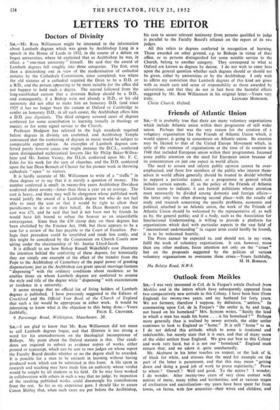LETTERS TO THE EDITOR
Doctors of. Divinity
Ste,—Mr. Ross Williamson might be interested in the information about Lambeth degrees which was given by Archbishop Lang in a speech in the House of Lords in 1932, in the course of a debate on bogus universities, where he explained that as Archbishop he was, in effect, a " one-man university " himself. He said that the award of Lambeth degrees fell roughly into three categories. The first, even then a diminishing one in view of the modernisation of cathedral statutes by the Cathedrals Commission, since completed, was where the old statutes of a cathedral required the Dean to be a D.D. or a B.D., and the person appearing to be most suitable for the office did not happen to hold such a degree. The second followed from the long-established custom that a diocesan Bishop should be a D.D., and consequently, if a Bishop were not already a D.D., or his old university did not offer to make him an honorary D.D. (and since 1925 it has no longer been the custom at Oxford or Cambridge to confer an honorary D.D., in all such cases), the Archbishop offers him a D.D. lure dignitatis. The third category covered cases of degrees conferred for some contribution to learning (usually in theology or music), or for some signal service to the Church.
Professor Hodgson has referred to the high standards required before degrees in divinity are conferred, and Archbishop Temple announced that the conferring of degrees in music would be subject to comparable expert advice. As examples of Lambeth degrees con- ferred purely honoris causa one might instance the D.C.L., conferred upon distinguished ecclesiastical lawyers like Sir Philip Baker-Wilbra- ham and Mr. Justice Vaisey, the D.Litt. conferred upon Mr. F. C. Eeles for his work for the care of churches, and the D.D. conferred upon the late Dean Bennett of Chester for his pioneer work in throwing cathedrals " open " to visitors.
It is hardly accurate of Mr. Williamson to write of a " traffic " in these degrees or to say that it is merely a question of money. The number conferred is small: in twenty-five years Archbishop Davidson conferred about seventy—fewer than three a year on an average. The cost is heavy, and there may well be clergymen whose published work would justify the award of a Lambeth degree but who do not feel able to meet the cost or that it would be right to allow their parishioners to do so on their behalf. In Dean Bennett's case the cost was £71, and he said that had it not been met by friends he would have felt bound to refuse the honour as an unjustifiable extravagance. Since then the £30 stamp duty on these degrees has been abolished by the Finance Act, 1948, but there appears to be a case for a review of the fees payable to the Court of Faculties. Per- haps their procedure could be simplified and made less costly, and this might be considered by the Commission on Church Courts now sitting under the chairmanship of Mr. Justice Lloyd-Jacob. It is difficult to see how Bishop Russell Wakefield's case illustrates the Intention behind the conferring of these degrees, for historically they are simply one example of the effect of the transfer from the Pope to the Archbishop of Canterbury of the papal power of granting dispensations; just as the Archbishop can grant special marriage-licences " dispensing " with the ordinary conditions about residence, so he enables those on whom Lambeth degrees are conferred to assume the style and title of the degree while " dispensing " with examinations or residence in a university.
It seems strange that no official list of living holders of Lambeth degrees is published. I have previously suggested to the Editors of Crock ford and the Official Year Book of the Church of England that such a list would be appropriate in either work. It would be interesting to know what is the objection to this being done.—Yours


































 Previous page
Previous page